Reflections from being rejected to be New Zealand’s first CTO: What I think the country needs
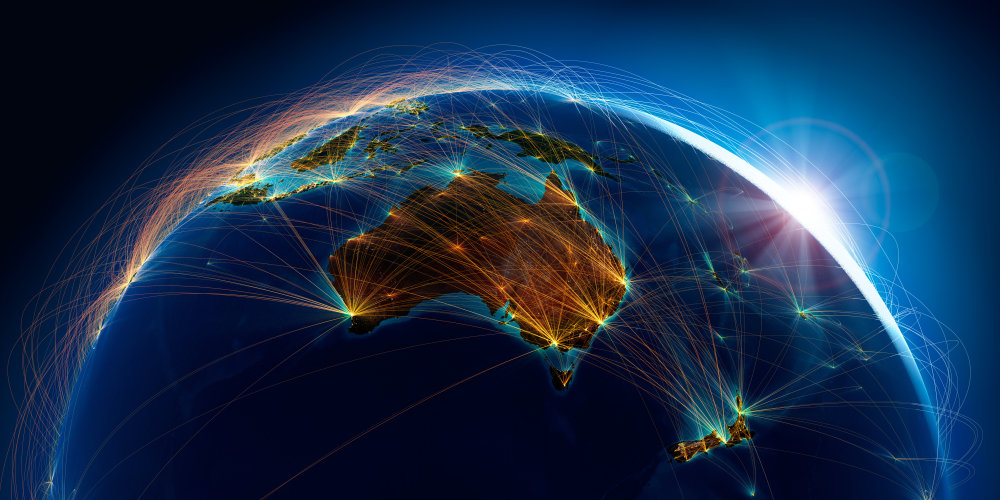
A few month’s ago a few friends inspired me to apply for the role of New Zealand’s first CTO, a leading role to define a public vision to bring NZ into the digital age as a global leader.
Now those few who really know me, know that I’d never willingly put myself forward for such a role; this is too big an ask for someone suffering as much imposter syndrome as the best of us.
But you do what you need to do to make a difference?—?even if it takes you outside of your comfort zone.
It’s easy to discount applying for roles like this without much critical thinking because it’s a ‘government’ role?—?but the more and more I thought about this, the more I was convinced that big leadership roles such as this are one of the only ways to have serious and lasting impact on a small country like New Zealand.
As many know, I’ve been working tirelessly and at often at significant personal expense to build a more capable and sustainable innovation ecosystem in New Zealand for the last 15 years, but you can only go so far doing that from the ground up.
When I started ZeroPoint Ventures, our vision and mission was much more aligned with the late Sir Paul Callaghan’s, in that for a small ecosystem like ours, the knock-on benefits of creating 100 x $1M+ companies, rather than a handful of $100M companies (and killing others whilst trying) would be significantly more impactful across jobs, wealth, and the general prosperity of our nation.
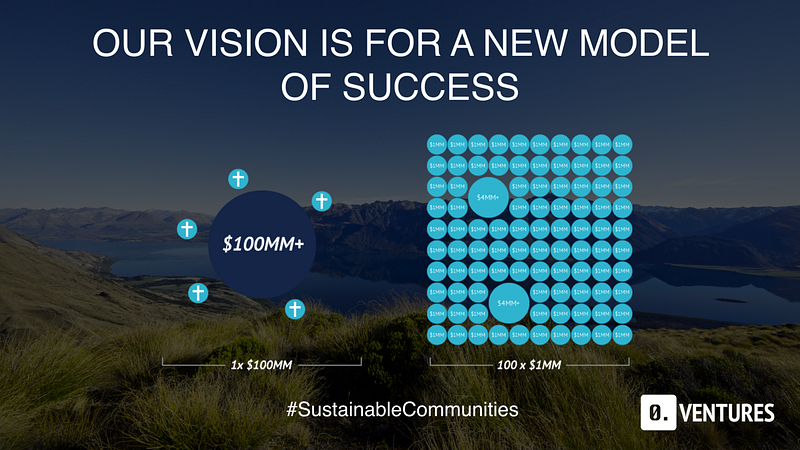
But my last experiment in the space and follow-on discussions left me deflated. I still wonder what the catalyst for real long-term impact and change will be as we all end up doing more of the same.
And when you end up hearing things like this from respected friends:

You start believing that you can be that change.
So I set my personal insecurities aside, and stepped up to apply for the role.
My application for NZ’s first CTO
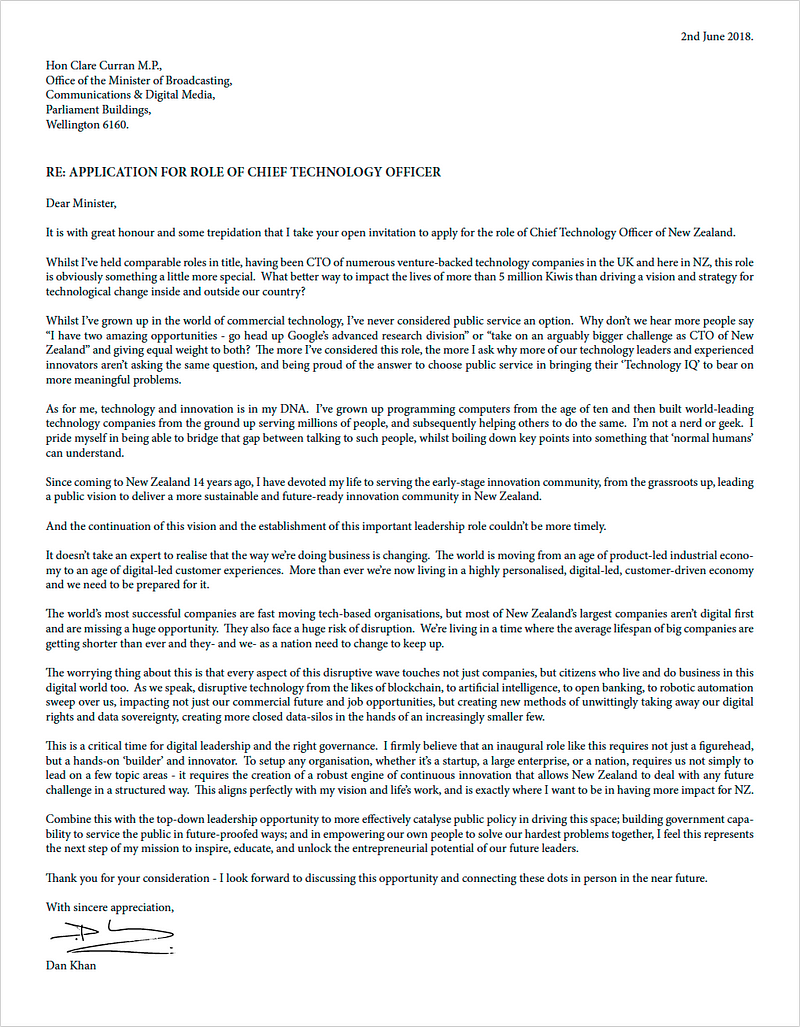
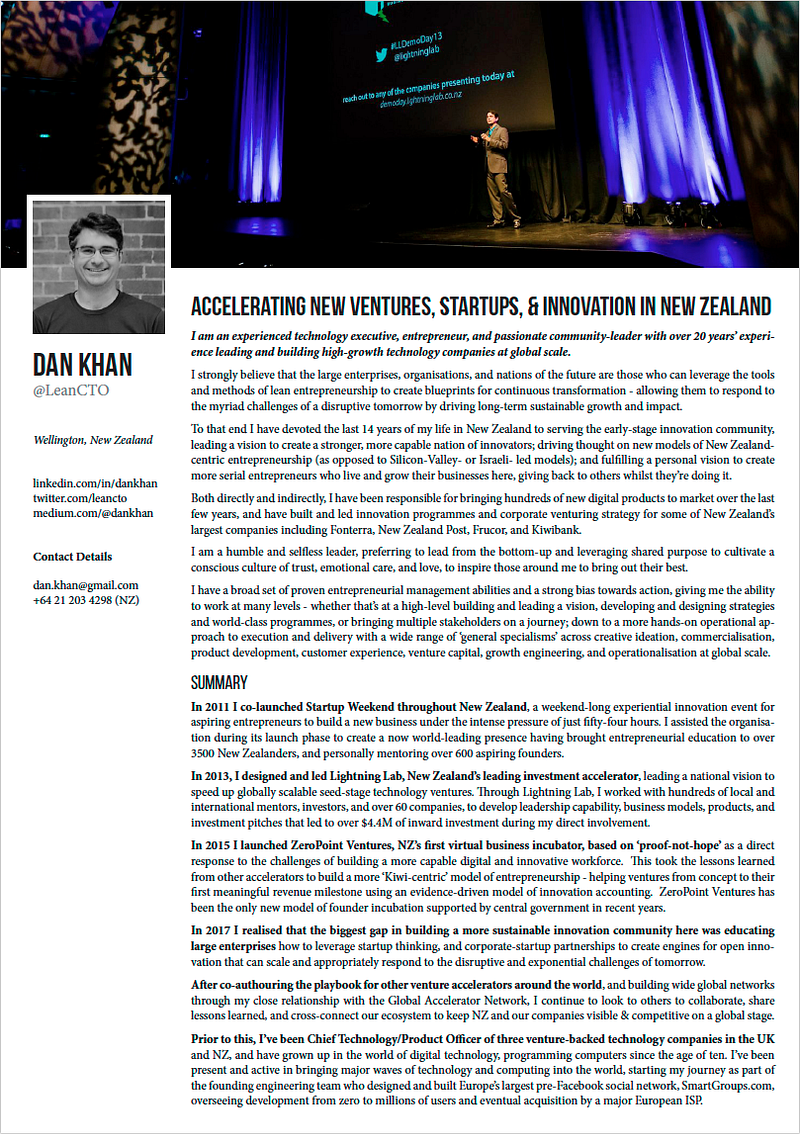
As these say, I’m a technologist, having grown up programming computers and then having been at the cutting-edge of digital innovation ever since.
Better still, I’ve been chief technology officer three times or more in my career?—?each time in respectable venture-backed companies overseas and in New Zealand.
Whilst traditionally a CTO role in a large organisation is mostly visionary, given the lack of resources available to implement a vision in this role, it seems more akin to a founding CTO in a technology startup rather than one inside a large organisation.
Which means it needs someone who’s more hands-on, and able to operate at a high-level on vision whilst leading delivery at a lower level too, inspiring the nation to come on board that vision and help.
This was the context in my application for what New Zealand needs (much of which was also inspired by how other nation’s CTOs talk about their duties).
Application process
The application process for this appointment was already suffering under heavy pressure from a failed first attempt, and this second application process felt similarly vague, feeling throughout that Government didn’t really know what they were looking for.
Still, I put my best step forward submitting my application, and after 3 weeks of silence, heard back that I was selected to go through to the next stage.
It was bad timing for me, we’d just launched our new 1-week not-for-profit venture accelerator programme, 0.Sprint, and we were mid-flow. That programme was a super intense week-long burst, taking ventures across 6 x 12 hour intensive days (including the weekend), which just happened to fall during the week I got my reply to the application:
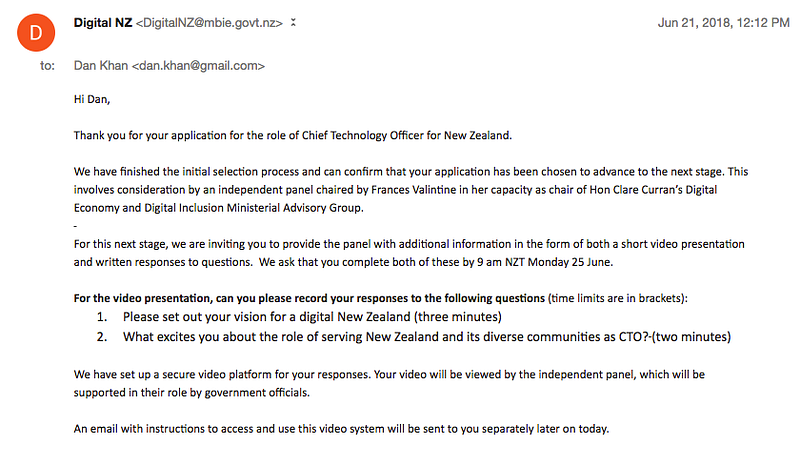
After the initial excitement of getting to the next stage subsided, I realised that receiving this on Thursday afternoon, with responses due by 9am the next Monday, disappointingly meant only 1 working day to complete the important follow-up questions and video answers to some extremely big questions.

Now I’m no stranger to working over the weekend, but giving applicants one working day (with no prior warning) for the next stage of a formal process in government, seems to put you unnecessarily under duress, and is a big ask when you’ve committed to run an intense programme of work that goes throughout the weekend.
Especially when you consider the gravity of the questions to be answered:
- Set out your vision for a digital NZ
- How would you develop a digital strategy for New Zealand?
- What are the key skills needed for success?
The right questions for sure, but big, big questions that you’d want to pull the right content, tone, and message together to deliver the right impact.
Not all of us have the time and occasion to draft up a well-crafted and practiced speech and pitch it to the Minister at a showcase event designed to raise such profile, and certainly not in one day over an already packed weekend.
But I got there, with a vision which I felt was well-formed, and deceptively simple.
My vision for a digital NZ
Q1?—?Please set out your vision for a digital NZ (3 minute video)
Your response:
“I’ve been thinking a lot about how build a vision for a nation.
When I think about building any sort of vision whether that’s for an individual, a company, or a nation, the principle is the same?—?you have to look forward to look back.
How do we want our country to look five years from now, in 10 years, how do we want New Zealand to look in 20 years from now?
The world we live in today is moving so fast that it’s hard for people and businesses, let alone governments to keep up.
Whilst Internet 1.0 was about information, the new Internet is all about value.
When systems like Alexa or smart contracts are executing more and more monetary transactions online?—?it challenges our notions of trust, ownership, and our meaning of stored value.
We’re already seeing tech like AI, robotics, and autonomous vehicles having rapid impact on people’s lives, and I believe their convergence with fast-moving nanotech, biotech, and new energy, will only act as a multiplier.
But this new digital revolution is also bringing great challenges.
Already we’re seeing a shift from smaller homegrown companies to massive overseas firms consolidating power over everything from shopping or search or social media and more sinisterly, our data.
The challenge for governments is not only to survive, but to allow us all to thrivein this new digital frontier.
Luckily for us, there are already great models out there. Look at Estonia or Finland, recognised as the world’s most developed digital nations.
Once previously obscure, they’ve provided leadership on how to reinvent ourselves to stay relevant in a digital world.
In these economies, every citizen transacts with the government online first; cuts through red-tape with digital identities; and redefines where their citizens live and work.
I believe we have to lean into that change, not step back.
My vision for New Zealand is simple, yet aspirational.
I want New Zealand to be the world’s most developed digital society.
- A New Zealand that’s open, transparent, and agile, that’s able to respond to any digital threat and opportunity as it emerges.
- A New Zealand whose people are connected, capable, and innovative?—?who are able to redefine the impossible for personal and commercial success.
- A New Zealand that’s caring and customer-focussed and exists to make our digital lives not just functional, but delightful.
- And a New Zealand where our citizens, not our companies, determine the governance and sovereignty of our own personal data.
How do we get there?
Well, whilst no-one can predict this future, previous inventions show us that we won’t get there by continuous improvement and incremental gains.
We need to ‘jump the curve’ to be the world’s most developed digital society, for the good of all New Zealanders.”
A digital strategy for NZ
Q2?—?The CTO will play a lead role in developing a digital strategy for New Zealand. How would you approach this task and what relevant prior experience of delivering programmes of work do you have to draw on?
Your response:
“I believe that any such digital strategy needs to stretch our thinking and allow us to think radically different to be prepared for a new digital future.
Government cannot- and should not- come up with this strategy alone. Our approach, therefore, needs to ensure inclusivity, diversity of thinking, and be grounded in global best practice, but with enough agility for us to experiment with what works best for New Zealand.
After understanding the internal and external resources available in this role, my general approach would be to:
- Deepen my understanding of the current cross-sector issues, challenges, and threats by engaging with both private and public sectors, across our diverse communities;
- Understand who’s already doing this really well in the world, to develop a model of best-practice adapted for our unique culture and location;
- Develop some key future-facing values to guide the strategy;
- Understand our future outcomes and issue the right challenges as calls to action;
- Develop a draft strategic framework that all New Zealanders can contribute to;
- Refine some key focus areas from those submissions and working groups;
- Develop a timeline and key tactical projects to deliver those strategic drivers, working with senior leaders inside and outside government;
- Build an adaptive model of measuring progress that allows us to use continuous experimentation, which learns from our mistakes, to guide implementation.
In terms of developing digital and innovation strategies, I’ve been doing this at a high-level and at a hands-on delivery level for commercial clients for the last 14 years in New Zealand.
I believe the vision I have led for accelerating the creation of globally scalable and investment-ready technology companies in New Zealand is the closest direct experience to the job to be done here?—?from setting a vision, to rallying the right stakeholder communities, to then being hands-on building out that strategy through to execution over the last 5 years.
I can also draw on the experience of the many startup companies I’ve founded and advised to go from idea to scale within short periods of time, as it’s the essence of defining a future state, and then executing to reach that state.”
Key skills required for a nation’s CTO
Q3?—?The CTO will need to work collaboratively with a wide range of audiences and stakeholders to succeed, including government, the technology industry and wider New Zealand communities. What do you think will be the key skills and approaches required for success with this engagement?
Your response:
- Visionary leadership;
- Persistence and resilience working the levers of bureaucracy and finding ways around perceived constraints;
- An ability to create goodwill in colleagues who’s future way of working or current plans may be perceived as under threat;
- A broad network outside of government;
- An ability to inspire people who hadn’t considered government service to come to Wellington and help New Zealand;
- A willingness to ‘roll-up-the-sleeves’ and get stuff done whatever the job takes;
- Engagement with all of New Zealand’s communities;
- Love, compassion, and respect;
- Passion and commitment to making change.
Reflections
So that’s me.
Baring the inner-most parts of my soul on paper, and now online, as someone looking to build a future New Zealand that we can all be proud of.
But unfortunately, my best wasn’t good enough.
I got rejected a few days later with no real depth of explanation, and without ever having spoken to a human throughout the process.
For something that you’ve poured not only your heart into and focussed so much energy into believing that you might just be able to pull this role off, it was a disappointing end.
Whilst I admit I may not immediately be 100 percent of what you might expect for this role, who really is —no-one else has done this job before in New Zealand! I did, however, think I had the skills, vision, and experience to actually be good at this?—?enough to at least warrant talking to either the Minister or the selection panel.
Either way, I hope there’s enough in there to inspire or inform whoever finally gets the role.
I shared my application primarily to provide my thoughts on what I think New Zealand needs to do differently to actively lead this space as a world leader.
And that’s a big challenge and opportunity for whoever takes it on.
Closing thoughts
There’s been lots of discussion on the topic of whether we need a CTO and speculations as to the suitability of the ‘open-secret’ current front runner over the last week.
I’m a believer that we can be a world leader of a digital first nation, but that we need different leadership to get there.
We don’t need much of the same, and we don’t just need a good vision.
We need belief, good execution, and someone who will show us the way to get there.
These people, in my opinion, aren’t the obvious ones. They’re the ones who have the strength of will, sheer determination, and ability to change a nation from the ground upwards, leveraging the top-down leadership this role should provide.
The ingredients for change are here, inside and outside of government, and just require a little mixing, with a lot of leadership.
And engagement with people on the ground already actively doing it.
Whomever gets this job, I hope they’re a positive role model for both men and women in the tech industry alike, and has the resources, support, and ability to deliver on their vision.
I’m here to help in whatever way I can, to serve New Zealand, and help us get there together.




